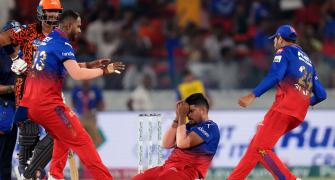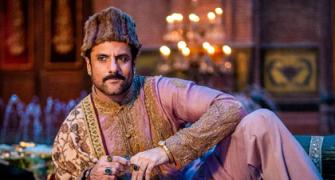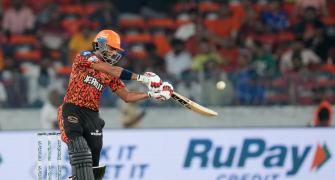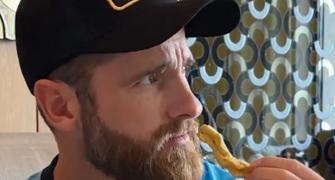Indian American Ryna Karnik has bagged the third place and a $50,000 scholarship in the Intel Science Talent Search, often dubbed the 'Junior Nobel Prize'.
The 17-year-old is a student of the Oregon Episcopal School in Portland. She was one of the seven Indian Americans among 40 finalists. That works out to 40 per cent -- a staggering figure considering that Asian Americans constitute only five per cent of the total population of the United States.
None of the other six Indian American finalists placed in the top 10. They will, along with the remaining 30 finalists, receive a $5,000 scholarship and a Intel Centrino Mobile Technology-based notebook computer.
The Intel Science Talent Search is America's oldest and most prestigious high school science scholarship.
Karnik was placed third for her patent-pending design method for constructing microchips, which may save developers time and money when creating and testing prototype semiconductor chips.
After receiving the award Karnik hugged her parents -- Milind and Parizad Karnik -- who immigrated to the US in 1982 from Mumbai. The award function was held in the atrium of the Ronald Reagan Building and International Trade Center.
After the ceremony Karnik told rediff.com: "I am absolutely ecstatic and walking on water. This is just amazing. I did not expect this. Wow!"
Karnik hopes to major in physics in college and eventually go into medicine. But she has not decided which university to go to. She described her meeting with President George W Bush as the highlight of the weeklong expenses paid trip to Washington. "I did get a chance to shake the hand of President Bush, which was awesome," she said.
Karnik and the other finalists also interacted with leading scientists and Nobel laureates, and visited Capitol Hill and other places of historical and political importance in the nation's capital.
The winner of the competition was Herbert Mason Hedberg, 17, of North Attleboro, Massachusetts, who won the $100,000 scholarship for his development of a faster, more efficient method to diagnose cancer by screening for telomerase inhibitors and ranking their potency as potential tumour suppressors.
| |||||||||||
"These exceptional young scientists are already producing the kind of innovative thinking and solid results that this country must have to keep America the centre of innovation," Intel Chief Executive Officer Craig Barrett,.
"As I look at these exceptional finalists, I see promise for the future of scientific discovery in America and hope other students follow their example to pursue scientific excellence," he said.
Dr Andrew Yeager, chairman of the judging committee, who is director of Stem Cell Transplantation at the University of Pittsburgh Medical Center, said, "The top 10 were selected based on their overall knowledge of the sciences, ability to apply science to problem solving, ability to think creatively and uniquely and passion for scientific research."
Over the past 63 years, STS alumni have been recipients of the world's most coveted science and math honours, including five Nobel prizes, three National Medals of Science, ten MacArthur Foundation genius fellowships and two Fields Medals.








